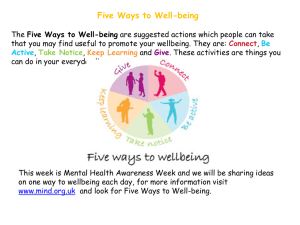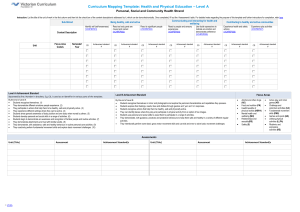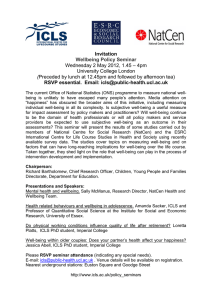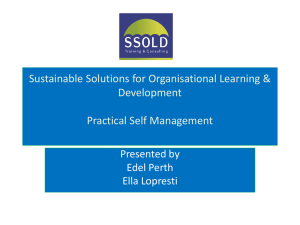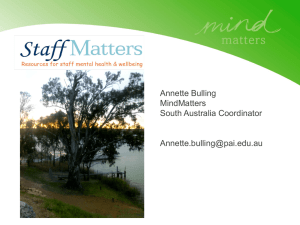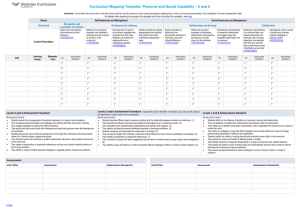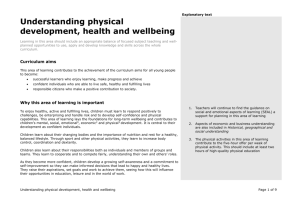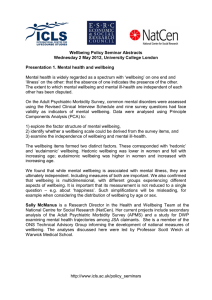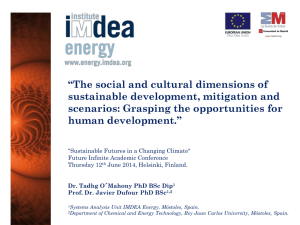Personal, Social, Emotional Development, Well Being and Cultural
advertisement
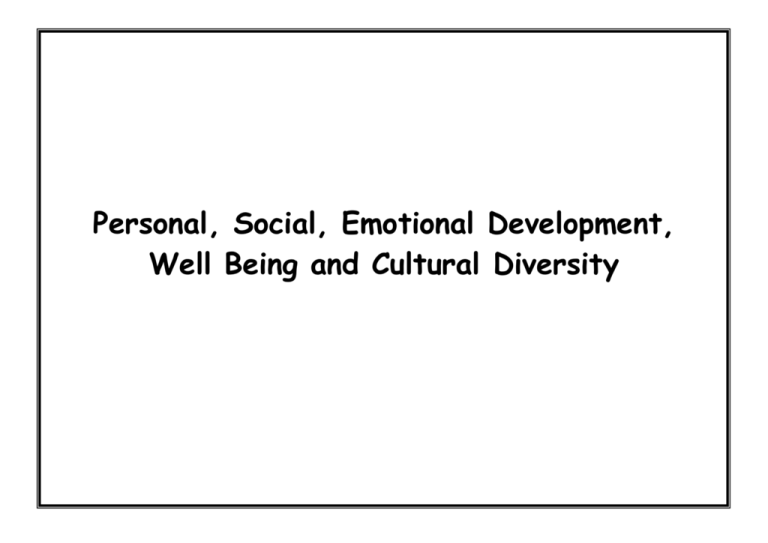
Personal, Social, Emotional Development, Well Being and Cultural Diversity Name: Personal and Social Development, Well-Being and Cultural Diversity Outcomes Personal Children are dependent of familiar adults emotionally. OUTCOME 1 Children may need assistance with everyday self-help (personal) skills but are usually keen to help Social They have started to express in simple terms how they feel and respond to social greetings. Children may have a tantrum when frustrated but are learning that some behaviour is unacceptable. They have begun to role play on their own or in parallel with other children, often near a familiar adult. Wellbeing They show knowledge of familiar care routines. Further evidence for assessment Date Evidence Name: Personal and Social Development, Well-Being and Cultural Diversity Outcomes Personal Date Evidence Children like to help adults and peers but not when it conflicts with their interests. Children have become aware of their own feelings and emotions and are beginning to identify with those of others. OUTCOME 2 They are trying to be independent but sometimes need assistance. Social Wellbeing They demonstrate affections for other children and may play with them. When supported by an adult, children are willing to share toys and materials and will take turns. They are beginning to develop an awareness of personal safety in particular dangerous hazards. Further evidence for assessment Name: Personal and Social Development, Well-Being and Cultural Diversity Outcomes Personal Children have become more independent in their learning and are able to cope with change to routines. They demonstrate some control over their emotions and will often adopt the standards of behaviour of adults that are close to them. OUTCOME 3 They are able to cater for most personal needs independently. Social Wellbeing They recognise and are increasingly sensitive to the needs of others. They are beginning to recognise appropriate behaviour for different situations and respond to reason. They are beginning to understand that all living things should be treated with care, respect and concern. Further evidence for assessment Date Evidence Name: Personal and Social Development, Well-Being and Cultural Diversity Outcomes OUTCOME 4 Personal Social Wellbeing They increasingly show self-control and are able to wait for their needs to be met. They are able to concentrate on a task and have definite likes and dislikes. Children will take part in cooperative play independently. They are becoming increasingly aware of the similarities and differences between themselves and their peers, and recognise cultural differences and diversity. Children enjoy caring for the environment such as plants and pets. Children support, comfort and help other children when they are sad or upset. They are aware of healthy eating habits and can distinguish between foods that are healthy and those that are not. Further evidence for assessment Date Evidence Name: Personal and Social Development, Well-Being and Cultural Diversity Outcomes Personal Children associate, cooperate and communicate appropriately with peers and familiar adults and seek help when necessary. They recognise and can express their feelings appropriately (also well-being). In the main, they are able to control their emotions and cope with disappointment. OUTCOME 5 Social Wellbeing They respect others and value their achievements. They have a clear understanding of right and wrong and are more aware of other people’s feelings, views and beliefs. They have grasped the concept of fair play and have an understanding of rules and why they are there. Children have a greater understanding of the consequences of their actions and take responsibility for decisions that they make. They understand that to keep their bodies healthy they will need to eat and drink appropriately. Further evidence for assessment Date Evidence Name: Personal and Social Development, Well-Being and Cultural Diversity Outcomes Personal Children have learned that they can and often do control their emotions. Children are competent in identifying problems and coming up with solutions to solve them. They are able to demonstrate skills of perseverance, concentration and motivation. OUTCOME 6 They demonstrate appropriate self-control. Social Children understand how they can improve their learning and can be reflective. They have begun to form friendships which are very important to them, and idol/hero figures are significant in their play and lives. They understand that people have different preferences, views and beliefs Moral and They have an understanding of how they should relate to others morally and ethically. Spiritual Wellbeing Children have moved on to be able to see things from other children’s and adults’ points of view. Further evidence for assessment Date Evidence Other sources of evidence for assessment may include - Written work (if applicable) - Annotated photographs - Video and/or audio files - Records of children’s progress - Tracking systems - Post its or written observations Consider the following routines as opportunities to observe or opportunities to discuss pupil’s learning/understanding - within Continuous Provision areas including the outdoors - during child initiated activities - during planned focused activities - during collaborative working - during problem solving activities e.g. ‘Lets’ Think’, challenges as part of enhanced provision - play time and outdoor sessions including using ‘Playground Pal/ Buddy/ Friendship Stop’ systems - during discussions around stories - snack & or lunchtime - during healthy school initiatives/activities - circle time - RE activities & during or participation in assemblies - PE /games activities and physical activities e.g. using Play to Learn or Busy Feet - ESDGC activities - ‘Forest School’ activities - during Dina School, Golden Time and general behaviour in & around school - attitude & or behaviour towards peers, familiar adults, visitors - during School Council/ Eco/ other school group meetings

